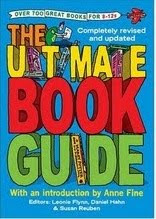 Unlike most of our Book-of-the-Week choices, this isn’t a brand new book – it was published in the early months of last year – but it’s a book we particularly wanted to commemorate this week as it has just been awarded the Carnegie Medal, the most prestigious prize for children’s books in the UK.
Unlike most of our Book-of-the-Week choices, this isn’t a brand new book – it was published in the early months of last year – but it’s a book we particularly wanted to commemorate this week as it has just been awarded the Carnegie Medal, the most prestigious prize for children’s books in the UK.To reach the Carnegie title Bog Child had a really strong shortlist to beat – Cosmic by Frank Cottrell Boyce; Black Rabbit Summer by Kevin Brooks; Airman by Eoin Colfer; Ostrich Boys by Keith Gray; The Knife of Never Letting Go by Patrick Ness; and Creature of the Night by Kate Thompson. While I’ve not yet read the Brooks or the Thompson, the others are all exceptionally good, and I’m sure the judges’ decision was extremely difficult. But Bog Child is undoubtedly a very worthy winner indeed.
Set on the Ireland / Northern Ireland border in 1981, it’s the story of Fergal who is eighteen and – like everyone around him – trapped by history and politics. His brother Joe is a political prisoner at the infamous Maze prison where a hunger strike has already claimed its first victim; and he himself is distracted from his looming exams by a friend of Joe’s who wants Fergus to smuggle packets across the border. Packets of what, though – explosives?
Digging for peat just over the border one day, Fergus and his uncle stumble across the body of a child, who has been preserved in the bog for centuries. When Felicity, an archaeologist, comes over to work on the discovery, Fergus falls for her daughter; but as he falls for Cora, his dreams are also being haunted by the voice of the bog child herself…
With fully-drawn characters, and a plot and mood sometimes floatingly happy and sometimes utterly gut-wrenching (but consistently beautifully written, every line…) Bog Child is a book not easily forgotten. And though at times upsetting, dealing with upsetting and difficult subjects, Dowd leaves you with a great sense of warmth, and even – almost – a kind of optimism; and yet this never rings false, never feels contrived. An extraordinary achievement by a very fine writer.
Recommended by Daniel Hahn
P.S. Alongside the awarding of the Carnegie Medal, the Kate Greenaway Award was also announced this week, and I’m delighted that this year it has gone to Catherine Rayner for her picture book Harris Finds His Feet. The lovely Harris… is slated to be our Book of the Week number (22), a fortnight from now, so come back and read Susan’s recommendation of that from the 13th. Next week, though, Leonie recommends our BotW (21), What I Saw and How I Lied, including an exclusive interview with author Judy Blundell, too...




.jpg)

